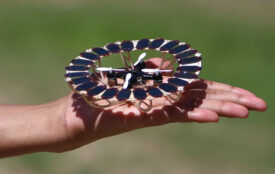Climate Change: Restrictions in Research Can Be Rational Under Specific Conditions
Lowering the consequences of climate change by reducing the amount of solar radiation the earth receives (Solar Radiation Management, SRM) has been controversially discussed in science since about 10 years.
Even the mere idea of SRM and research on it may have far-reaching consequences on climate policies. An interdisciplinary team of experts from environmental economics and meteorology under the lead of the Kiel Institute and the University Kiel has analyzed, under which conditions open ended SRM research should be done. The study has been published in the Journal of Environmental Economics and Management.
Solar radiation management (SRM) receives increasing attention as a means of last resort to combat dangerous climate change. Yet, there is a vivid debate about its uncertain effectiveness and potential harmful side effects. This is because the application of SRM measures fails to mitigate part of the damage resulting from increased atmospheric carbon concentrations (e.g., ocean acidification) and also may involve several inherent side effects, ranging from the reduced occurrence of blue skies to alterations of the hydrological cycle. The discussion on the question whether or not to conduct SRM research centers around the arguments that such research could create a “slippery slope” that leads to eventual deployment and the “moral hazard” that the expectation of a so-called “easy fix” for the climate change problem may undermine emission control. Based on such arguments, a prominent proposal in the governance debate about climate engineering SRM research is to establish a (temporal) ban on certain research activities, in particular those involving field testing of SRM technologies.
Within the research priority program “Climate Engineering – Risks, Challenges, Opportunities?” funded by the German Research Foundation (DFG), an interdisciplinary team of experts from environmental economics and meteorology has developed an intergenerational decision theory about SRM research under uncertain climate damage and uncertainty in SRM efficacy and harmfulness. The framework allows to analyze the effect of increased likelihood of deployment due to research (“slippery slope”), and the effect of decreased emission control effort when anticipating potential deployment of SRM (“moral hazard”). In contrast to much of the literature, the present study considers open-ended research, which may also reveal that SRM is not a viable option (harmful or ineffective). The analysis shows that only under two conditions it would be rational to abstain from open-ended SRM research (e.g. field tests), namely i) time-inconsistent decision-making and (ii) sufficiently small prudence.
i) Time-inconsistent decision making means, loosely speaking, that the current generation does not trust in the emission control decisions of future generations. Not conducting SRM research, and thus depriving the future generations from information about SRM, may force them to increase emission control. The authors find that time-inconsistent decision-making is a necessary condition for the current generation not to perform SRM research. This type of time preferences has been considered in the usual debate on the social cost of carbon and mitigation intensity, but has so far not played an important role in the debate on SRM research.
ii) Open-ended research allows for an outcome that rules out the SRM option, because it turns out to be ineffective or to generate harmful side-effects. In this outcome, the next generation will increase emission control effort compared to the case where they have no extra information about safety or harmfulness of SRM. Economists measure the magnitude of such an effect by a preference parameter called “prudence”. For a high degree of prudence, the second generation’s abatement effort, on average over the different outcomes of SRM research, will be larger than abatement effort without information about the safety or harmfulness of SRM. In this case, the first generation would like to provide information about SRM even under time-inconsistent decision-making. The authors therefore find that a small prudence is a second necessary condition for the current generation not to perform SRM research.
“A definite answer to the question whether or not to conduct SRM research is beyond the scope of our study”, says Wilfried Rickels, environmental economist at the Kiel Institute for the World Economy. “Yet, personally I would favor time-consistent decision-making, and prudence is traditionally deemed a virtue. Our analysis shows that these conditions favor a decision for open-ended research.”
The original study has been published online in the latest issue of Journal of Environmental Economics and Management, volume 84, Pages 1–17, http://dx.doi.org/10.1016/j.jeem.2017.02.002.








